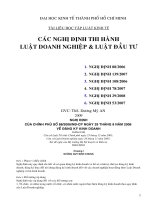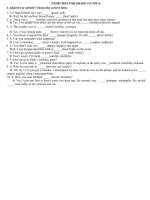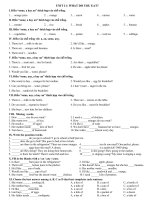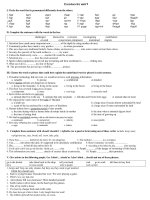Tài liệu COMPARISON & EXERCISES
Bạn đang xem bản rút gọn của tài liệu. Xem và tải ngay bản đầy đủ của tài liệu tại đây (184.92 KB, 17 trang )
COMPARISON
A - Comparison with -er/-est
clean - cleaner - (the) cleanest
We use -er/-est with the following adjectives:
1) adjectives with one syllable
clean cleaner cleanest
new newer newest
cheap cheaper cheapest
2) adjectives with two syllables and the following endings:
2 - 1) adjectives with two syllables, ending in -y
dirty dirtier dirtiest
easy easier easiest
happy happier happiest
pretty prettier prettiest
2 - 2) adjectives with two syllables, ending in -er
clever cleverer cleverest
2 - 3) adjectives with two syllables, ending in -le
simple simpler simplest
2 - 4) adjectives with two syllables, ending in -ow
narrow narrower narrowest
Spelling of the adjectives using the endings -er/-est
large larger largest leave out the silent -e
big bigger biggest
Double the consonant after short vowel
sad sadder saddest
dirty dirtier dirtiest Change -y to -i (consonant before -y)
shy shyer shyest
Here -y is not changed to -i.
(although consonant before -y)
PAGE 1
COMPARISON
B - Comparison with more - most
difficult - more difficult - (the) most difficult
all adjectives with more than one syllable (except some adjectives with two syllables - see
2 - 1 to 2 - 4)
C - Irregular adjectives
good better best
bad worse worst
much more most uncountable nouns
many more most countable nouns
little less least
little smaller smallest
D - Special adjectives
Some ajdectives have two possible forms of comparison.
common commoner / more common commonest / most common
likely likelier / more likely likeliest / most likely
pleasant pleasanter / more pleasant pleasantest / most pleasant
polite politer / more polite politest / most polite
simple simpler / more simple simplest / most simple
stupid stupider / more stupid stupidest / most stupid
subtle subtler / more subtle subtlest
sure surer / more sure surest / most sure
Difference in meaning with adjectives:
far
farther farthest distance
further furthest
distance or
time
late
later latest
latter x
x last
old older oldest people and things
PAGE 2
COMPARISON
elder eldest people (family)
near
nearer nearest distance
x next order
Ghi chú: Các cách so sánh của tính từ đều áp dụng được cho trạng từ (adverbs). Để tiện lợi
hơn, trong phần này chúng tôi gọi chung là tính từ.
Khi đưa vào so sánh tính từ có ba mức độ: mức độ nguyên thể (positive degree), mức độ so
sánh (comparative degree) và mức độ cực cấp (superlative degree). Các hình thức so sánh hơn,
bằng, kém, đều dựa trên các mức độ này.
Người Việt Nam khi học tiếng Anh quen gọi là thể so sánh hơn, so sánh bằng, so sánh kém và
so sánh nhất. Cách gọi này có khi không thích hợp vì không thể so sánh một người hay vật ở
tình trạng “nhất” được. Tuy nhiên cách gọi này đã quá quen thuộc nên chúng tôi cũng tạm
thời sắp xếp theo các cách gọi ấy.
Trong các dạng so sánh ta còn có khái niệm tính từ dài và tính từ ngắn. Tính từ ngắn (short
adjectives) là tính từ một vần (syllable) và những tính từ hai vần nhưng tận cùng bằng phụ âm
+ Y. Tính từ dài (long adjectives) là những tính từ hai vần còn lại và các tính từ từ ba vần trở
lên.
I. Thay đổi hình thức khi thêm ER hay EST
1. Tính từ tận cùng bằng phụ âm + Y: Chuyển Y thành I trước khi thêm ER/EST.
Ví dụ:
happy - happier/happiest;
dirty - dirtier/dirtiest
nhưng
grey - greyer/greyest;
gay - gayer/gayest
2. Tính từ tận cùng bằng 1 nguyên âm + 1 phụ âm: Gấp đôi phụ âm cuối trước khi thêm
ER/EST. Ví dụ:
thin - thinner/thinnest;
big - bigger/biggest
PAGE 3
COMPARISON
nhưng
green - greener/greenest
3. Tính từ tận cùng bằng E: Bỏ E trước khi thêm ER/EST:
ripe - riper/ripest ;
white - whiter/whitest.
II. Thể so sánh hơn (Comparison of Superiority)
Tính từ ngắn: adj. + ER (than)
Tính từ dài: more adj. (than)
long - longer ; beautiful - more beautiful
Harry is older than William.
Alice is more careful than her brother.
III. Thể so sánh bằng (Comparison of Equality)
Bằng: as adjective as
Không bằng: not so (as) adjective as
This garden is as large as ours.
(Khu vườn này lớn bằng khu vuờn của chúng tôi.)
She is as careful as her sister.
(Cô ấy cẩn thận hơn chị cô ấy)
It is not so (as) hot as it was yesterday.
(Trời không nóng bằng ngày hôm qua)
David is not so (as) careful as Kathy.
(David không cẩn thận bằng Kathy.)
IV. Thể so sánh kém (Comparison of Inferiority)
less adjective (than)
PAGE 4
COMPARISON
It is less cold today than it was yesterday.
Ngày hôm nay ít lạnh hơn ngày hôm qua.
Tuy nhiên, trong tiếng Anh người ta thường ít sử dụng cấu trúc so sánh kém này.
Thay vào đó, người ta dùng cấu trúc so sánh bằng. Ví dụ:
Thay vì nói: This table is less long than that one.
Người ta nói: This table is not so (as) long as that one.
V. Thể so sánh cực cấp (Superlative)
Tính từ ngắn: the adj.+ EST
Tính từ dài: the most adjective
clear - the clearest;
sweet - the sweetest
interesting - the most interesting;
splendid - the most splendid
VI. Các tính từ (trạng từ) đặc biệt
Positive Comparative Superlative
good/well better best
bad/ill worse worst
little less (lesser) least
near nearer nearest (next)
many/much more most
far farther (further) farthest (furthest)
late later (latter) latest (last)
old older (elder) oldest (eldest)
(out) outer (utter) outmost (utmost) -
PAGE 5
COMPARISON
outermost (uttermost)
(up) upper uppermost
(in) inner inmost, innermost
(fore) former foremost, first
VII. Thể so sánh kép (Double Comparative)
Khi cần diễn tả những ý nghĩ như “càng…. càng…” người ta dùng thể so sánh kép (double
comparative). Thể so sánh kép được tạo thành tùy theo số lượng ý mà ta muốn diễn đạt.
Nếu chỉ có một ý ta dùng:
Đối với tính từ ngắn: (adjective) and (adjective)
It is getting hotter and hotter.
(Trời càng ngày càng nóng)
His voice became weaker and weaker.
(Giọng nói của anh ta càng ngày càng yếu)
Đối với tính từ dài: more and more adjective
The storm became more and more violent.
(Cơn bão càng ngày càng dũ dội)
The lessons are getting more and more difficult.
(Bài học càng ngày càng khó)
Nếu có hai ý ta dùng The (adjective)…, the (adjective)…. cho cả tính từ ngắn lẫn tính từ dài.
(Lưu ý rằng trong các cấu trúc trên (adjective) có nghĩa là tính từ ở thể so sánh hơn).
The sooner this is done, the better it is.
(Chuyện này làm càng sớm càng tốt)
The older the boy is, the wiser he is.
(Thằng bé càng lớn càng thông thái)
VIII. Ghi chú về các thể so sánh của tính từ
PAGE 6









